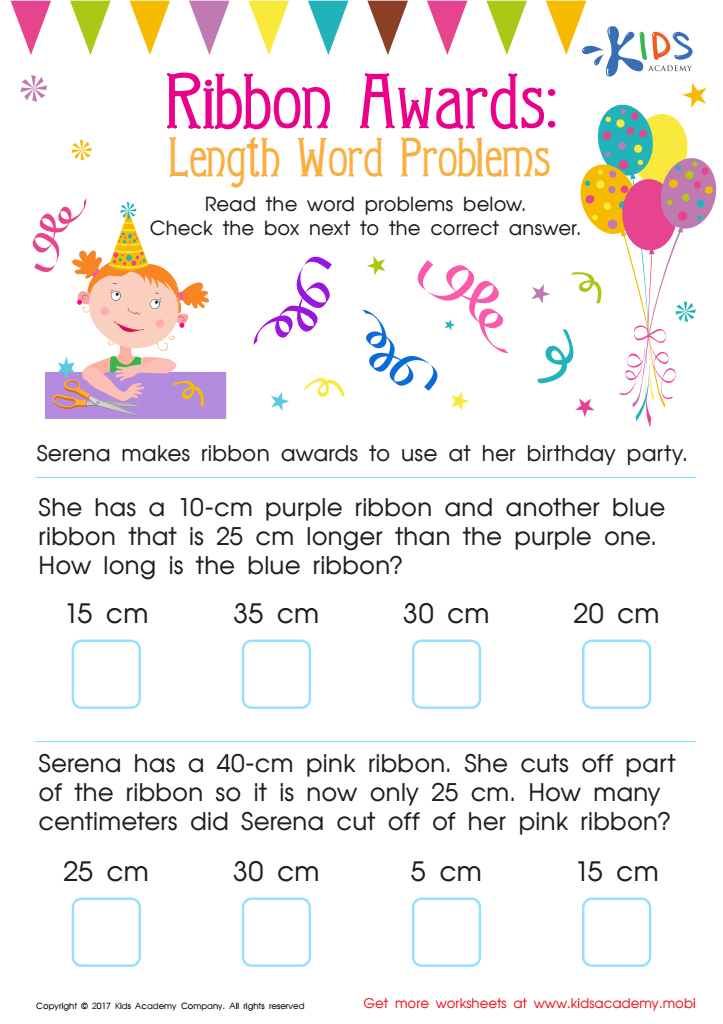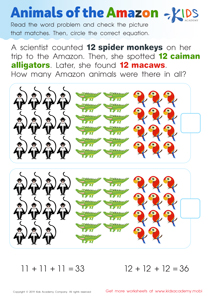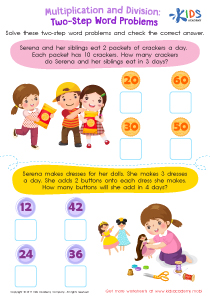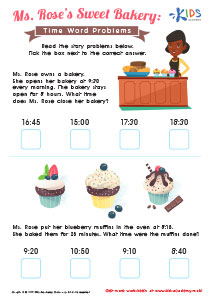Extra Challenge Length and Mass Word Problems Worksheets for Ages 7-8
1 filtered results
-
From - To
Introducing our Extra Challenge Length and Mass Word Problems worksheets, expertly designed for children aged 7-8 years. These educational online printables offer young learners the opportunity to master essential skills in measurement through engaging and thoughtfully crafted problems. Each worksheet is tailored to challenge their understanding of length and mass, enhancing their mathematical reasoning and problem-solving capabilities. Perfect for home or classroom use, these printables ensure a fun and interactive learning experience that helps solidify core concepts in a real-world context. Equip your child with the tools for success in math with our comprehensive educational resources.


Length Word Problems Worksheet
The Value of Educational Interactive Worksheets on Length and Mass Word Problems for Children Aged 7-8
In the foundational stages of a child's educational journey, particularly around the age of 7 to 8, grasping the concepts of length and mass is crucial. These concepts not only form an integral part of their mathematics curriculum but also play a significant role in their everyday interactions with the world. It is here that educational interactive worksheets specifically focused on length and mass word problems prove to be exceptionally beneficial.
Engagement Through Interaction
First and foremost, educational interactive worksheets are designed to captivate the interest of young learners. Children at this age are naturally curious and eager to explore new things. By integrating interaction into learning tasks, these worksheets make the learning process more engaging. Instead of passive reception, students actively participate in solving problems, which enhances their cognitive development and helps retain their interest and focus.
Practical Application of Theoretical Concepts
Length and mass are not just abstract numbers in a textbook; they are measurable attributes that children encounter in their daily lives. Educational interactive worksheets on these topics help bridge the gap between theoretical knowledge and practical application. By presenting word problems that mimic real-life scenarios, such as measuring ingredients for a recipe or estimating the weight needed to balance a scale, children learn to apply their mathematical skills in a meaningful context. This relevance to everyday situations reinforces their understanding and appreciation of the subject matter.
Building Problem-Solving Skills
Word problems require a different set of skills compared to straightforward calculation tasks. They demand reading comprehension, analytical thinking, and the ability to apply mathematical concepts to solve a problem. Educational interactive worksheets on length and mass word problems encourage children to read carefully, understand the problem context, and figure out the necessary calculations to arrive at a solution. This holistic approach not only enhances their math skills but also develops their overall problem-solving abilities, which are crucial across all areas of education and life.
Customizable Difficulty Levels
One of the significant advantages of educational interactive worksheets is their adaptability to different skill levels. Children aged 7-8 can show a wide range of abilities in understanding and solving mathematical problems. Interactive worksheets can be easily adjusted to cater to this diversity, providing simpler problems for those who are just starting to grasp the concepts and more complex challenges for those who are ready to advance. This customization ensures that all children can progress at their own pace, reducing feelings of frustration and encouraging a positive attitude towards learning.
Immediate Feedback and Reinforcement
A key feature of educational interactive worksheets is the ability to offer immediate feedback. As children work through length and mass word problems, these digital platforms can instantly inform them whether their answers are correct or incorrect. Immediate feedback is critical for learning as it allows children to quickly understand their mistakes and learn the correct concepts without developing persistent misconceptions.
Moreover, this instant response system encourages a trial-and-error approach, where children can experiment with different solutions without fear of failure, fostering a resilient learning attitude. This feedback loop not only promotes self-correction but also enhances their confidence as they see real-time progress in their problem-solving skills.
Supporting Diverse Learning Styles
Children have varied learning styles—some are visual learners, while others prefer tactile or auditory learning experiences. Educational interactive worksheets can cater to these diverse needs by incorporating elements such as graphics, animations, and interactive elements that require dragging and dropping or clicking. Such features help in visualizing abstract concepts of length and mass, making them more accessible and easier to understand for all learners regardless of their preferred learning style.
Encouraging Cooperative Learning
While worksheets are often used for individual learning, they also offer opportunities for cooperative educational experiences. Children can work together on interactive worksheets, discussing how to solve complex word problems and sharing different strategies. This collaboration not only enhances their understanding but also helps develop essential social skills such as communication, negotiation, and the ability to work effectively in teams.
Facilitating Continuous Learning
Finally, educational interactive worksheets are excellent tools for continuous learning outside the traditional classroom environment. They can be accessed from home, on a trip, or during holidays, ensuring that learning doesn't stop when the school bell rings. This flexibility supports ongoing education, allowing children to practice and improve their skills routinely and consistently.
In conclusion, educational interactive worksheets on length and mass word problems are an invaluable resource for children aged 7 to 8. They not only make learning more engaging and relevant but also enhance critical thinking and problem-solving skills while supporting diverse learning styles and continuous educational growth. By integrating these tools into the educational framework, we can provide our young learners with a robust foundation in mathematics that will benefit them throughout their academic and personal lives.
 Assign to the classroom
Assign to the classroom





